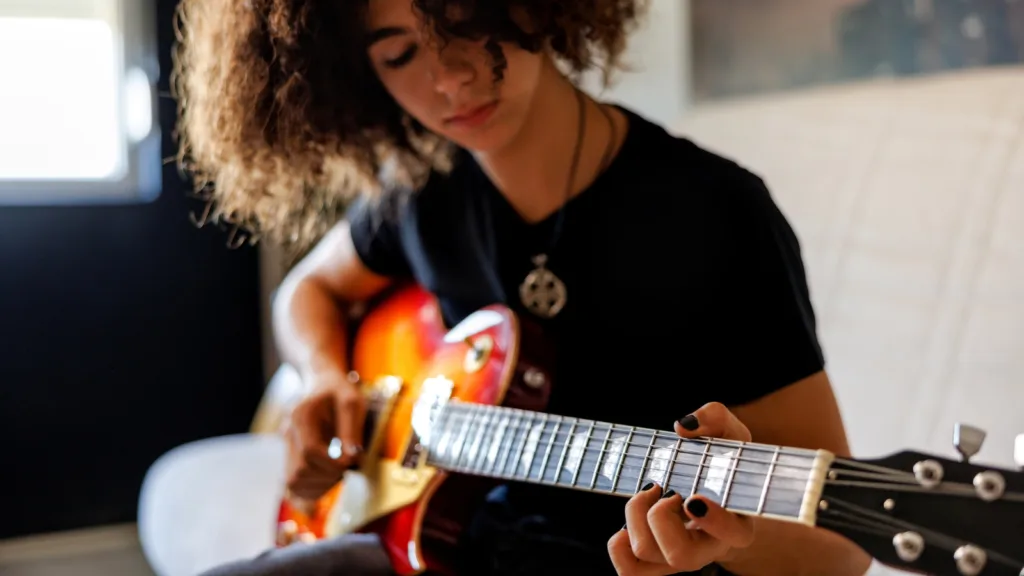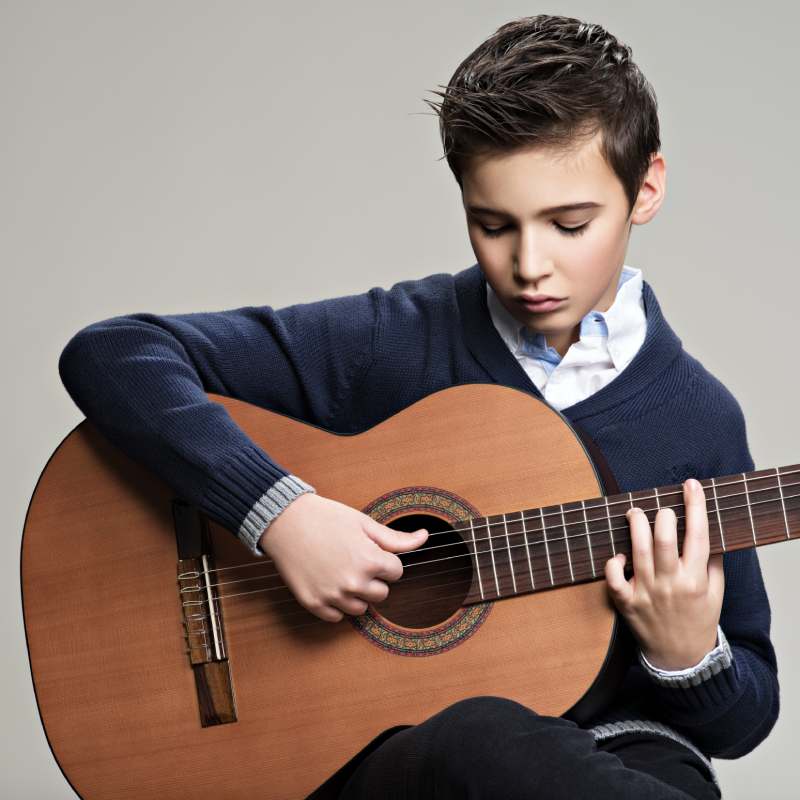As a parent, you want to support your child’s interests and help them explore their talents. And if your 12-year-old is showing an interest in learning how to play the guitar, you may be wondering which one would be best for them. With so many options on the market, it can be overwhelming and confusing to make a decision.
But don’t worry! In this article, I’ll guide you through everything you need to know about choosing the perfect guitar for your 12-year-old. From different types of guitars and sizes to consider, to budget-friendly options and tips for finding the right fit for your child’s needs. By the end of this comprehensive guide, you’ll have all the information necessary to confidently choose the best guitar for your 12-year-old and support their musical journey. So let’s get started!
So, Which guitar is best for 12 year old??
Choosing the best guitar for a 12-year-old can be a daunting task, but fear not! With some guidance and knowledge, you can find the perfect instrument that will inspire your child’s musical journey. There are several factors to consider when selecting a guitar for a young player, such as size, type of strings, and budget.
Firstly, it is important to choose an appropriately sized guitar for your child. A full-sized guitar may be too large and difficult for them to handle comfortably. Look for smaller sizes like 3/4 or 1/2 scale guitars specifically designed for children. These guitars have shorter necks and narrower bodies which make them easier to hold and play.
Next, consider the type of strings on the guitar. For beginners, nylon strings are recommended as they are easier on the fingers than steel strings. They also produce a softer sound which is more suitable for younger players.
Budget is another crucial factor when purchasing a guitar for your child. It’s understandable that parents want to invest in high-quality instruments but keep in mind that your child may outgrow their first guitar quickly as they progress in skill level. Consider starting with an affordable option and upgrading later if needed.
Some popular choices among young players include acoustic guitars like Yamaha FG JR1 or Fender FA-115 Dreadnought Acoustic Guitar Starter Pack which comes with all necessary accessories including picks, strap, tuner etc., making it convenient for both parent and child.
Electric guitars are also great options as they tend to have thinner necks which make playing chords easier for small hands. The Squier Mini Stratocaster or Epiphone Les Paul Express Electric Guitar would be good choices within a reasonable price range.
It’s also important to involve your child in the decision-making process by letting them try out different types of guitars before making a final decision together. This will ensure that they feel comfortable with their chosen instrument and excited about learning how to play.
In conclusion, the best guitar for a 12-year-old is one that fits their size and skill level, has appropriate strings, and falls within your budget. With these factors in mind and by involving your child in the process, you can find the perfect guitar that will inspire them to continue their musical journey.
Understanding the Different Types of Guitars Suitable for 12 Year Olds
Choosing the right guitar for a 12-year-old can feel like navigating a maze, but it’s really all about matching their budding interests and physical comfort. To start with, consider an acoustic guitar. These are fantastic because they don’t need any external equipment to produce sound, making them straightforward for beginners. Acoustic guitars come in various sizes; a smaller-bodied one would be ideal for young hands that are still growing. The lightweight nature and portability of acoustics also mean your child can easily take it anywhere—from music lessons to camping trips.
Another appealing option is the electric guitar. Electrifyingly cool, these guitars often capture the imagination of kids who dream of rocking out on stage. Electric models usually have thinner necks than acoustics, which makes pressing down strings less demanding—perfect for fingers still gaining strength. However, keep in mind you’ll need additional gear like an amp and cables to get started with this type of guitar.
If neither acoustic nor electric fits just right, you might want to explore something hybrid like an electro-acoustic, merging both worlds harmoniously. These versatile instruments provide the rich tones of an acoustic with added amplification possibilities when plugged into an amp. No matter which style you choose, make sure it’s something that excites your 12-year-old; after all, fostering passion is key to nurturing their musical journey!
Evaluating Body Size and Playability for Young Guitarists
Choosing a guitar for young musicians involves more than just picking an instrument that looks cool. The body size and playability of the guitar are critical factors that can significantly impact their learning experience and long-term interest in playing. Smaller hands require smaller instruments, so opting for a 3/4 or even 1/2 size guitar can make all the difference. With these scaled-down versions, kids can easily reach around the neck to form chords without straining their fingers or wrists. This comfort naturally leads to better practice sessions and quicker progress.
When it comes to playability, it’s about how easy it is for them to press down on the strings and move up and down the fretboard smoothly. Lighter gauge strings are often preferable because they require less pressure, which reduces finger soreness—a common complaint among beginners. Additionally, consider guitars with lower action (the distance between the strings and fretboard). High action makes pressing down tougher, especially for little fingers not yet accustomed to such tasks.
Overall, selecting a properly sized guitar with high playability features ensures young learners stay motivated rather than frustrated.
Key considerations include:
- Guitar Size: Opting for 3/4 or 1/2 sizes
- Lighter Gauge Strings: Easier on small hands
- Lower Action: Less strain during practice
This thoughtful approach could be what keeps your budding guitarist enthusiastic about making music!
Read also: acoustic guitar sweetwater

Recommended Acoustic Guitars for Beginners
Learning to play the guitar is a wonderful journey, and choosing the right acoustic guitar can make all the difference. For beginners, it’s essential to find an instrument that’s comfortable and has good sound quality without breaking the bank. Some of my top picks include:
- Yamaha FG800: This model stands out for its warm tone and easy playability. The solid spruce top provides a rich sound that evolves with time.
- Fender FA-115: Another excellent choice, it’s affordable yet offers a balanced tone that suits various music styles.
When picking your first acoustic guitar, you should also consider comfort and fit. Look for something with a smooth neck finish so sliding your fingers up and down feels like butter on bread. Sound-wise, clarity matters; you want each strum to resonate beautifully. Don’t forget accessories either! A decent tuner will keep you sounding sharp, while lightweight strings are easier on beginner fingertips.
Investing in any of these guitars ensures you’re not just buying an instrument but starting your musical adventure off on the right note—literally! Each strum becomes more enjoyable as you develop calluses and confidence alike.
The world of melodies awaits!
Choosing Electric Guitars for Kids: What to Look For
When selecting an electric guitar for a child, it’s important to consider several key factors that ensure the instrument is both enjoyable and conducive to learning. Firstly, size matters a great deal. Guitars come in various sizes, from full-sized models to 1/4 or 3/4 sized versions specifically designed for younger players with smaller hands. A guitar that’s too big can be uncomfortable and disheartening to play; therefore, opting for one that fits well makes all the difference in fostering a positive experience.
Another vital consideration is the weight of the guitar. Electric guitars made from lighter woods are more manageable for kids and reduce fatigue during practice sessions. Besides weight, also pay attention to the simplicity of controls. Guitars with basic knobs and switches rather than complex features will allow children to focus on playing rather than getting overwhelmed by settings they might not need initially.
Additional points include:
- Tone Quality: Look for a pleasing sound without any buzzing.
- Aesthetics: Consider colors or designs your child loves.
- Cable Length: Check if it allows enough movement space.
Overall, ensuring comfort combined with ease-of-use at this early stage is essential in nurturing their budding musical journey.
You may also like: sherman clay upright piano
Budget Considerations When Buying a Child’s Guitar
When it comes to buying a guitar for your child, budget is one of the most important considerations. Kids grow quickly and their interests can change just as fast, so you may not want to invest in an expensive instrument right away. You can find quality beginner guitars that won’t break the bank—typically in the range of $50 to $150. These entry-level models are perfect for young beginners because they offer decent sound quality without demanding a hefty investment.
- Evaluate how serious your child is about learning. If they’re just testing the waters, start with something affordable.
- Look out for deals or second-hand options. Sometimes you can score great instruments at yard sales or online marketplaces like Craigslist or Facebook Marketplace.
Another thing to consider is long-term value. While it’s tempting to go for the cheapest option available, sometimes spending a little more initially pays off down the line. Cheaper guitars often require frequent tuning and might not be durable enough to survive rough handling by younger kids. Mid-range options usually come with better build quality and may include essential accessories like gig bags or tuners. Investing wisely ensures that if your child’s interest grows into passion, you won’t need another purchase anytime soon.
This careful balancing act between cost and quality will set up both you and your budding musician for success.
Conclusion: Supporting Your Child’s Musical Journey Through the Right Guitar Choice
Choosing the right guitar for your child can be an exciting adventure, but it also requires some thoughtful consideration. Size matters a lot—you wouldn’t want to hand a five-year-old a full-sized guitar any more than you’d give them adult-sized shoes! Smaller guitars like half-size or three-quarter size are perfect for little hands and fingers still learning how to move across the strings. The type of music they’re interested in plays a big role too; if they dream of strumming folk songs around a campfire, an acoustic guitar might suit them best. On the other hand, if they’re captivated by rock ‘n’ roll energy, perhaps look into getting them an electric one.
Here’s where preferences come into play: does your child love colorful patterns or classic wood finishes? A guitar that aligns with their personality can make practice sessions something they eagerly anticipate rather than avoid. Don’t overlook practical aspects either—consider lightweight models that won’t tire out young shoulders and adjustable straps for comfort. When you see the joy on their face as they pluck those first few notes, you’ll know all this effort was worth it.
- Size: Half-size or three-quarter size guitars.
- Type: Acoustic vs Electric based on musical taste.
- Aesthetics: Colorful patterns versus classic finishes.
- Comfort: Lightweight models and adjustable straps.
Supporting your child’s musical journey is about finding harmony between practicality and personal preference in their instrument choice.
This careful balance will turn every practice session into pure melodic magic!

